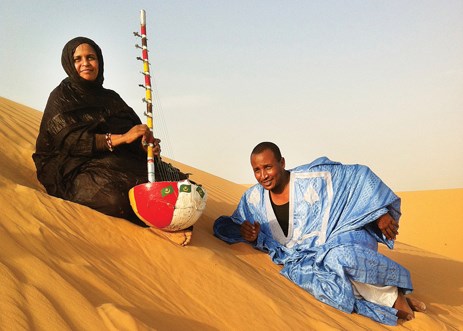Noura Mint Seymali, Sunday, Feb. 28 at 8 p.m. at the BlueShore Financial Centre for the Performing Arts at Capilano University. Tickets: $30/$27, visit capilanou.ca/blueshorefinancialcentre.
Drawing from both the ancient and modern worlds, Mauritania's Noura Mint Seymali and her ensemble, set to take the stage in North Vancouver Sunday night, are currently the only band hailing from the West African country actively touring on North American soil.
"There are no other artists from Mauritania doing what we're doing right now. It's an opportunity to see music from a part of the world that is very under-represented in pop culture and an area that's really interesting geographically. You'll hear a lot of Arab influence and a lot of West African Sub-Saharan influence too. I think it's the missing piece of the puzzle in a lot of people's mental maps of the music in Africa. Even people who are very well-versed in African music don't even know it sometimes," says Matthew Tinari, the group's drummer and producer.
Noura and her band are deep into a lengthy tour across the United States and Canada. With a month to go, they're set to make a stop at the BlueShore Financial Centre for the Performing Arts at Capilano University this weekend.
"We've gotten a good reception everywhere," says Tinari, reached Monday from Chicago where the ensemble was completing a visiting artist residency, Feb. 22-27, hosted by the Old Town School of Folk Music and the Inner-City Muslim Action Network.
Other bandmates include Noura's husband Jeiche Ould Chighaly, a renowned guitarist, and fellow Nouakchott, Mauritania resident Ousmane Touré on bass. Tinari, originally from the Philadelphia area, studied jazz and African studies at the post-secondary level. Based in Dakar, Senegal for the last eight years, he met his future bandmates at a music festival in Dakar in early-2010.
"They needed a drummer and they saw me playing with this other artist and invited me up to Mauritania to work with them. It was a serendipitous kind of a thing," he says.
"Mauritania music is quite mind-blowing and different from everything else in the region and so it's always really exciting to be able to play in Mauritania," he adds.
The ensemble is comprised of vocalist and frontwoman Noura, described by the band as "one of Mauritania's foremost musical emissaries. Born into a prominent line of Moorish griots, Noura began her career at age 13 as a supporting vocalist with her stepmother, the legendary Dimi Mint Abba." Noura received further musical training by her grandmother, Mounina, and plays the ardine, a nine-string harp reserved only for women. Further influential in her life was her father, Seymali Ould Ahmed Vall, "a seminal scholar figure in Mauritanian music," who adapted music for the national anthem.
"Noura has so much energy. It's unlike working with any other vocalist for me. She's got a lot of power vocally and that's really exciting. She's very adept rhythmically.. .. She has a very commanding presence and I feel like that's something that imbues the whole band. It's not just her, Jeiche is an amazing musician and so is Ousmane. So it's really great to be working with everyone," says Tinari.
The ensemble's last album was 2014's Tzenni, its name inspired by both a whirling dance performed to the music of Moorish griots in Mauritania, as well as a general concept open to interpretation.
"Tzenni is the first international release that we did in this current formation. The title track means 'to spin' or 'to turn.' We thought it was an interesting concept that could be applied to a lot of things, specifically the cyclical nature of modern life," says Tinari.
That said, subject matter on the record ranges, with some songs about love and another about Mauritanian cooking.
"It's a mixed bag," says Tinari.
Recorded in the Hassaniya language - Noura's tongue - and produced and recorded in New York City, Dakar and Nouakchott, the songs are mainly original interpretations of pieces in the canon of Moorish griot music as well as works written by Noura's father.
"We have this well-spring of music that we can draw on by right of both Noura and Jeiche being from griot backgrounds. For me the job has always been how to distill from that something that makes sense in the pop idiom. So if it's taking a melodic theme or a rhythm and rearranging it to work in a more contemporary way then that's what we do. The bassist and I are both very into funk and soul and RB music and so I think putting the bass and drums behind it gives it a little bit of meat and makes it a little more palatable. Harmonically, it's really out there for a lot of people that have never heard anything like this. It's quite a particular melodic tradition and so I guess rhythmically we try to. .. make it relatable in some way," says Tinari.
The four-piece is currently working on their next record, having completed one recording session so far.
"The sound has changed a bit but it is cohesive with the last album.. .. We're stretching the sound a little bit further and developing it a little more," says Tinari, adding if all goes well, they're shooting for a potential release in September.



